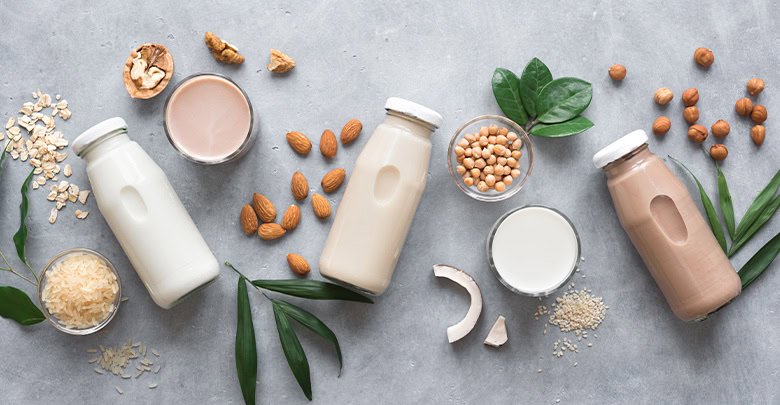Milk: These Options Are Better for You Than Cow’s Milk
Regular milk makes glucose management harder and can result in weight gain while other great low-carb sources of calcium are available

If you have any type of diabetes, there’s really no reason to be drinking cow’s milk on a daily basis.
Simply put, cow’s milk contains about 10 more grams of sugar per 8 ounces than the best-unsweetened alternatives.
Let’s take a look.
The highest-carb milk options: 12 to 25 grams per 8 oz
If you purchase the “unsweetened” forms of cow’s milk, oat milk, and rice milk, you’ll be getting anywhere from 12 to 25 grams of carbohydrates in one glass.
Cow milk (2%) — 12 grams carbohydrate
Goat milk (whole) — 11 grams carbohydrate
Rice milk (regular) — 23 grams carbohydrate
Oat milk (original) — 25 grams carbohydrate
The lowest-carb milk options: 1 to 2 grams per 8 oz
If you purchase the unsweetened forms of coconut milk, flax milk, cashew milk, and almond milk, you’ll get only 1 to 2 grams of carbohydrates in an entire glass! When it comes to your blood sugar, that’s pretty insignificant.
Almond milk (unsweetened, plain or vanilla) — 2 grams carbohydrate
Cashew/Almond milk (unsweetened, plain or vanilla) — 1 gram carbohydrate
Flax milk (unsweetened, vanilla) — 1 gram carbohydrate
Coconut milk (unsweetened, original or vanilla) — 1 gram carbohydrate
By switching your milk choice to one of these low-carb options, you could easily cut your daily carbohydrate consumption by at least 15 to 30 grams per day depending on how much milk you drink!
Other reasons to ditch cow’s milk as your source of calcium
There is an ongoing debate about whether calcium from cow’s milk helps or harms your bone health, the nutrition content in cow’s milk compared to today’s best milk alternatives makes it a pretty obvious choice.
It’s not clear that we need as much calcium as is generally recommended, and it’s also not clear that dairy products are really the best source of calcium for most people,” explains the Harvard School of Public Health.
“While calcium and dairy can lower the risk of osteoporosis and colon cancer, high intake can increase the risk of prostate cancer and possibly ovarian cancer.”
The Physicians Committee for Responsible Medicine echoed similar and additional concerns.
Research shows that dairy products have little or no benefit for bones. A 2005 review published in Pediatrics showed that drinking milk does not improve bone strength in children,” reported the PCRM.
“In a more recent study, researchers tracked the diets, exercise, and stress fracture rates of adolescent girls and concluded that dairy products and calcium do not prevent stress fractures.”
(Take a look at this list for better sources of calcium than cow’s milk!)
Low-Carb Yogurts to Consider
Yogurt can be a bit of a conundrum for those of us with diabetes. While good quality yogurt is loaded with probiotics (beneficial for your gut health), it’s often also loaded with sugar.
Dairy-based yogurts inevitably contain some lactose (milk sugar) even if they haven’t been sweetened with additional sugar. And the non-dairy options like coconut or soy desperately need some sugar to give it more flavor.
But if you don’t want sugar, you’re left with yogurts containing a whole lotta artificial sweeteners which could contribute negatively to your gut health — defeating one of the biggest points of eating yogurt!
Any yogurt containing any of the following ingredients isn’t any good for you:
- Candy, cookies, pretzels, etc. — this is processed dessert!
- high fructose corn syrup — well, duh!
- aspartame, saccharin, sucralose — these are chemicals, not food
- Food coloring — yogurt should be mostly white until you stir in real fruit
A problem with many of today’s commercial yogurts is that they are so over-processed they don’t actually contain any natural probiotics. Instead, manufactured probiotics have to be added in.
Don’t judge your yogurt’s health content based on simply the fat or carb-count, look at the bigger picture of what else is (or isn’t) in that yogurt to make sure it’s actually providing what it should.
These 3 yogurts are not only made with high-quality ingredients, but they also contain zero fake sweeteners and plenty of beneficial probiotics.
Siggi’s Strained Whole-Milk Yogurt: Plain: 6 grams net carbs (5.3 oz) or Fruit-flavors: 7 to 14 grams (5.3 oz)
It’s hard to beat Siggi’s. Made from whole milk, which means it comes with satisfying fat, even their fruit-flavored options contain fewer carbs than most plain yogurts. They also have some “no sugar added” flavors that contain just fruit. No matter which one you pick, you can trust you’re getting high-quality yogurt with genuine probiotics.
Fage Greek Yogurt: Plain: 7 grams net carbs (6 oz) or Fruit-flavored: 10 to 14 grams (6 oz)
Fage’s plain yogurt is pretty darn low-carb! But unless you have the world’s most sophisticated tastebuds ever, you’ll probably want to add a little flavor to it with nuts, berries, or a pinch of stevia. Regardless, Fage is proud to state that their yogurt is free of artificial sweeteners or other cheap filler ingredients that take away from the benefits of real yogurt.
GTS’ Cocoyo Living Coconut Yogurt: All flavors: 5 to 6 grams net carb (4 oz)
Sweetened with stevia — which is a plant-based no-calorie sweetener rather than a manufactured artificial sweetener — this vegan yogurt is by far touts the lowest carb-count on in the yogurt aisle. Even though it doesn’t contain the traditional probiotics of dairy-based yogurt, it comes with 25 million probiotics per serving, and you can trust those are legit probiotics because it’s made by the same brand that makes GTS Kombucha!